
Civilization VI's first expansion, Rise and Fall just launched this past weekend. The expansion does make some welcome enhancements to alliances that makes peaceful relations with other civs much more appealing. However, these enhancements do not address two of my most fundamental complaints with Civilization's diplomacy system in general: that it does not allow for truly cooperative victories, and that it does not really provide the player with any way to influence an A.I. civ's behavior. I've already written about ideas for cooperative victories for both Beyond Earth and for the core Civilization games, so I won't go into that again here. Instead, today's blog will focus on the second of my major hang-ups with diplomacy: that you simply cannot provide A.I. civs with any indication of what you consider friendly or hostile behavior.
Diplomacy has always been one of the major stumbling blocks of the Civilization games. Each game has certain mechanics or features that are good ideas on paper, but none of the games have ever really had a diplomacy system that really seems to work the way that it is intended, and which provides consistent behavior from the A.I.s. A.I.s are often erratic in their behavior -- both between games, and within a single game.
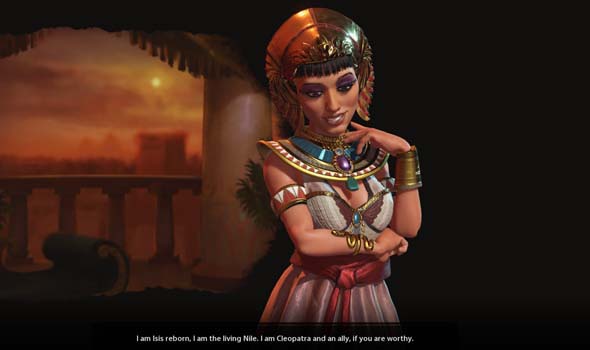
A single unit can be the difference between Cleopatra's abject disgust and her goo-goo-eyed adoration.
Civ VI introduces the agendas, which sound like a good idea on paper. It gives each leader an element of personality. They have things that they like, and things that they don't like. The problem is that these agendas lead to wild swings in an A.I.'s attitude, often based on rather trivial (and sometimes counter-intuitive) actions from the player. Often times the thresholds for activating these agendas are not entirely clear. Cleopatra tells me that my army is too weak and pathetic, and so she has a heavy negative modifier with me. Then I build a single Swordsman a couple turns later, and now suddenly my army is powerful enough to warrant her admiration, and she's looking me up and down with those goo goo eyes.
There's other legacy issues with diplomacy. The biggest one is the inability to ever warn another civ that their actions might lead to war. The denouncement mechanic of Civ V was a decent start, but since you could never provide a specific reason for your denouncements, they never seemed to have much weight in changing another civ's behavior. In a multiplayer game, you could always use the chat to inform other players' of your diplomatic desires, but there has never been any method for accomplishing this with A.I. civs in single-player.
Since the A.I. has no real clue why it is being denounced, there's no way for it to change its behavior. There's also no way for other A.I.s to understand if your denouncement or declaration of war is actually justified or not.

You can denounce a civ, but the A.I. won't really have any clue why they're being denounced.
Civilization VI tried to rectify this with the Casus Belli system, but that system also stumbles... [More]
892bf8a7-123e-470d-b094-32cec0a5eb7a|2|5.0
Tags:Sid Meier's Civilization, Civilization, Civilization V, Civilization VI, Civilization VI: Rise and Fall, leader, diplomacy, casus belli, friendship, agenda, denouncement, act of war, war, quest, city state, alliance, victory, AI
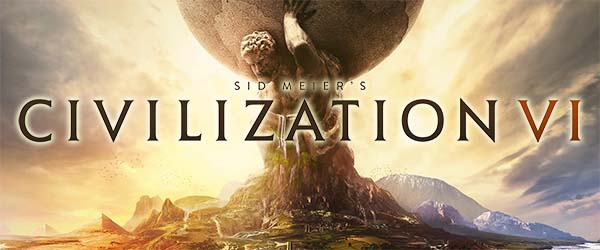
I already gave a pretty glowing review of Civilization VI. I did neglect talking about some of the problems and annoynaces that I have with the game. This is because most of these problems feel like relatively minor, nagging issues, rather than game-breakers, and the review was long enough as is without diving into nitpicks. So I decided to dedicate an entire post to these little nagging issues, nitpicks, and annoyances. Remember that I love the game! So the items listed here are not deal-breakers by any stretch. They are just small blemishes on an excellent game, and problems that I would like to see fixed in post-release patches.
Useability issues
While the game's UI is generally very minimal and clean, there are a number of frustrating issues with the user experience design.
Stop jumping around to different units!
Civ V had this same problem as well. The one-unit-per-tile rule means that after one unit moves, the game can't just skip to the next unit in the stack. Instead, it has to pick a unit somewhere else on the map. The logic for this doesn't seem to even bother trying to find a nearby unit or a relevant unit, and so the camera is constantly whipping around from one end of the map to the other. When trying to manage a large army during a war, this can get very annoying very fast.
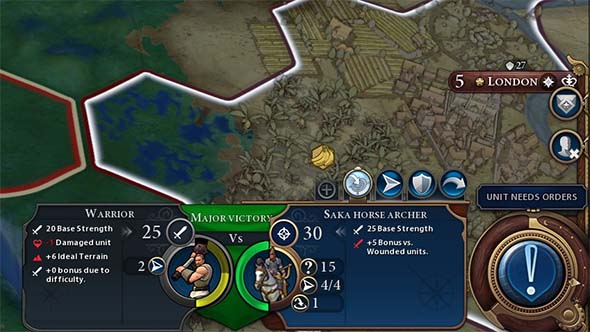
There's already a "Unit needs orders" prompt, so there's no need to jump around the map selecting units.
If suitable logic can't be implemented to make this unit-cycling work a bit smarter, then players should be given the option (via the options screen) to disable it entirely. This is especially true for multiplayer. There is already a "Unit needs orders" prompt, so it's easy enough to just use that to jump to another unit. Otherwise, the game should just wait and let the player actively click on the next unit that I want to move. Heck, even if smarter unit-cycling logic is written, the game should probably still provide the option to turn it off.
Allow us to disable tutorial tips that we've already seen
Each tutorial tooltip dialogue should come with an option to "don't show this tip again". Civ games are long, and they often aren't played through to completion. So when learning the game, I end up restarting often. And since the game is still new, I still have the tutorial tooltips turned ON. I do this so that I can be reminded of how the newer features work (particularly the late-game features that I haven't seen as much).
In order to see the late-game tutorials [RIGHT] for mechanics that I don't understand yet,
I have to sit through the tutorial messages for early-game mechanics [LEFT] that I fully understand.
Leaving the tutorials on, however, means that I have to sit through all the early-game pop-ups as well. I already know how a district works and what a city state is; I don't need to see these tutorial messages again! But it is nice to see the messages for late-game stuff like national parks, archaeology, and corps, since I still don't have much experience with those features yet.
As such, I should be able to turn off the tips that I've already seen and know, while leaving on the tips that I haven't seen, or don't yet know... [More]
eb02599a-204a-499d-b6c0-b6536654aee2|1|5.0
Tags:Sid Meier's Civilization, Civilization VI, civilization, strategy, grand strategy, turn-based strategy, history, user interface, tutorial, barbarians, AI, surprise war, notifications, diplomacy

Firaxis has given me a belated birthday gift by releasing Civilization VI. They've also ensured that I don't get very much productive done during the months of October and November this year, since I've been sinking a whole lot of time into "one more turn"-ing myself late into the night. I've barely scratched the surface of the newly-released Dark Souls III DLC, my Madden franchise has fallen behind, and I haven't even bothered buying recently-released games like the new Master of Orion. My board game collection has been collecting dust, and my Dungeons & Dragons campaigns have been on hiatus. I'll get back to all those things after one more turn.
Oozing with production quality
The first thing that stood out to me upon entering my first game was the artwork. It's a pretty stark contrast from Civilization V's visuals. Civ V favored a semi-photo realistic quality. Many screenshots of the game's map look like satellite photos, and units (though exceedingly large) looked and animated realistically. This created a lot of pretty screenshots (still images), but the game looked kind of static, washed-out, and dull in motion. VI, on the other hand, goes for an exaggerated, vibrant, and more cartoonish look that reminds me a lot more of Civ IV and Civ Revolution.
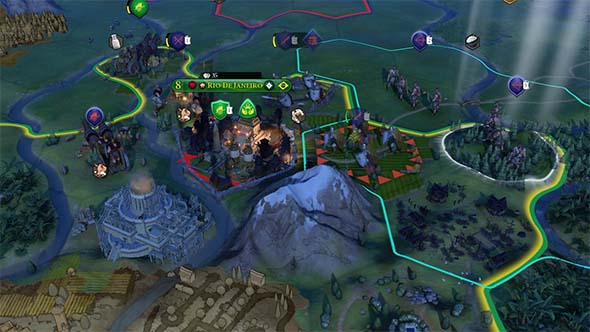
The graphics are vibrant and highly informative. Everything that you see on screen genuinely means something.
What I really like is how utilitarian the visuals are. Almost everything on the game map is communicating part of the state of the game to the player. You can see every piece of infrastructure in and around a city, as well as exactly which tiles are being worked, all without having to open a separate screen and without having to clutter the screen with extra UI icons. There's even different graphics to represent the different phases of a building or wonder's construction that tells you exactly what that city is currently constructing, and how close it might be to finishing that wonder. It's attractive, but it's also clean and informative.
The fog of war is also wonderfully functional and neat to look at. This game renders the fog of war with the style of a hand-drawn map on canvas (similar to Total War: Shogun 2, which I loved). Heck, there's even an animated day/night cycle that was seemingly added because ... why not?
Improvements have different graphics for when they're un-worked [LEFT] versus worked [RIGHT].
The rest of the game shows similarly high production quality. There's actual cinematics for the win screens instead of dialogue boxes with a static image. Finishing a wonder results in an in-game cutscene of that wonder's construction. It isn't quite as pretty as Civ IV's pre-rendered wonder movies, but makes up for it by providing a sense of context that makes me feel like I'm seeing "my Oracle" instead of just the Oracle. There's more historic quotes, all of which are narrated wonderfully by Sean Bean. Firaxis even brought back composer Christopher Tin for some of the music. The new theme music, "Sogno Di Volare" ["The Dream of Flight"] isn't as immediately catchy as "Baba Yetu", but it's still an uplifting, memorable track that stands out more than the menu themes of Civ V. Put simply, this game just looks and sounds terrific... [More]
b970ea1d-5fb2-48fe-9374-28eaf71e348a|2|5.0
Tags:Sid Meier's Civilization, Civilization VI, civilization, strategy, grand strategy, turn-based strategy, history, humanism, humanist, Civilopedia, city, empire-building, districts, hex, civic, social policy, diplomacy, Ed Beach, Christopher Tin, Sean Bean

Recently, I brainstormed the possibility of redesigning Beyond Earth's winstates in order to support cooperative victories. With Civilization VI having been announced last month, I want to take some time to look at some different ways to approach victories in the mainstream Civilization games. Since Civilization III, there have been five victory types that have appeared in every mainstream Civ game:
- the military victory = kill or conquer everyone else
- the science victory = build a space ship to Alpha Centauri
- the culture victory = accumulate the most culture yield (usually through wonders)
- the diplomatic victory = vote for yourself to be leader of the United Nations
- the score victory = if no other victories are met by a certain number of turns, the civ with the highest score wins.
Earlier games had fewer victories (only military and space race), but there have been other victory types as well. Civ III and IV had a victory that simply required the player to occupy a majority of the map's land area and population (which could be achieved via military conquest and/or relatively peaceful expansion). I liked this victory type because it facilitated role-play by allowing me to grow my empire organically without having to feel like I was constantly meta-gaming for one of the other victories - just keep growing by whatever means are necessary or convenient. Civ IV also had a religious victory that required you to convert other players to your religion and then get them to elect you to be Pope or whatever. Civ: Revolution and the board game even included an economic victory in which you must accumulate a certain amount of wealth tokens. This was different than the "economic victory" of Civ V, in which you save up enough money to buy out the alliance of every city state on the turn before a U.N. election.
Civilization IV included a religious victory [LEFT], and the board game includes an economic victory [RIGHT].
These victories are intended to provide a direct path to victory using each of the major fundamental gameplay styles. But are there other methods?... [More]
a7731900-5994-464b-bc32-bb3d6884e093|1|5.0
Tags:Sid Meier's Civilization, Civilization, Civilization V, Civilization VI, victory, military, science, culture, diplomacy, religion, high score, economy, peace, war, cooperation, humanism, humanist, alliance, ideology, space race, United Nations, world wonder, agenda, leaders, Theodore Roosevelt, board game, victory point, Ed Beach, Sean Bean, E3, Settlers of Catan, The Sims 2, Sid Meier's Civilization the Board Game

I'm starting to feel like quite the prognosticator. Earlier this year, I started tossing around the idea of Nomadic civilizations for future Civ games. Around the same time, Creative Assembly announced Attila: Total War. They had apparently come up with almost the same idea independently at the same time. Well, now the teams at Firaxis have also implemented a variation of my idea for their new expansion to Beyond Earth, called Rising Tide.
This expansion seeks to remedy several of the core complaints with the Beyond Earth game. In my original review for Beyond Earth, my two biggest complaints were that the game and its leaders lacked the personality and variety of Civilization V, and that it just didn't feel futuristic enough. Both of these complaints ended up being the major focus of the first expansion, which definitely helps to make Beyond Earth stand out a little bit from its more realistic counterpart.
So we sailed up to the sun, till we found a sea of green
One of Beyond Earth's biggest failings was its lack of creativity in using its futuristic setting to innovate gameplay. The game felt very much like a reskin of Civ V rather than a new game. A big part of this was that the map posed many of the same sorts of restrictions on players that the Civ V map did: mountains, canyons, and oceans were all obstacles either impassable by units or uncolonizable by cities.
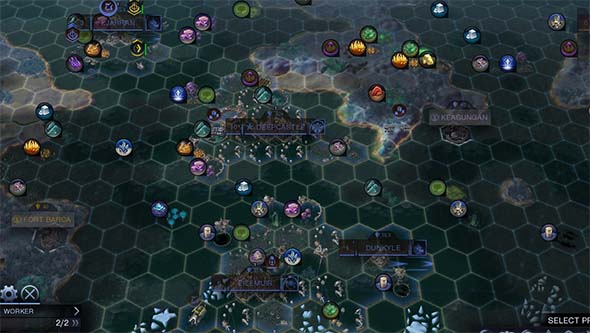
Aquatic cities and civilizations help to separate Beyond Earth's futuristic setting from Civilization's historical roots.
Well now one of those restrictions has been lifted, and civilizations can build floating cities in the oceans. Such cities can even be moved in order to claim new tiles or to act as mobile military bases. This opens up some interesting (and sometimes silly) new strategic possibilities, but the whole mechanic feels a bit contrived to me. Moveable cities is something that I think can work very well in Civilization, but I just don't feel that Firaxis gave us much reason to ever need to move cities in this game. My proposal for nomadic civilizations was two fold: such a faction could mobilize its entire civilization right up to an enemy's borders during war; and it could also move in response to changing map conditions (migrating animal resources or climate change) during peace. Beyond Earth hits that first point by turning cities into massive aircraft carriers, but there aren't any mechanics in place to make the map a factor.
Fish and other harvestable sea creatures don't migrate, and other resources don't move. So if you aren't using your aquatic cities as mobile military bases, then there's never any real need to move them. And if you're not playing as the North Sea Alliance faction, then the cost to move a city can feel prohibitively expensive. The people at Firaxis seemed to have recognized this, and so they made it so that aquatic cities don't grow their borders based on culture. Instead, you must either buy new tiles or move the city itself in order to acquire adjacent tiles. But since moving takes valuable production time away from the city, I rarely find myself moving a city, and instead I just buy any tiles that I want.
Aquatic cities can be moved, and can act as mobile military platforms and aircraft carriers.
There are other pros and cons to aquatic cities, such as health benefits, faster virtue acquisition, and more profitable trade routes. You can also move the cities around to temporarily acquire resources that allow you to build specific resource buildings, but at the cost of possibly temporarily hurting your city's growth or production (and maybe even starving the city if you move away from food-generating tiles). So there's a lot to think about when build an aquatic or nomadic civilization, but it all feels kind of like ad hoc mechanics in order to make the mechanic seem more meaningful than it actually is. That isn't to say that mobile cities is a bad feature in Beyond Earth. It's perfectly functional, and can be fun to play around with. It just feels a little gimmicky.
Just look at the world around you, right here on the ocean floor
It certainly helps that the oceans themselves are a much bigger part of the game. The ocean isn't just divided into coastal tiles and empty ocean anymore. There's a whole host of new aquatic resources, and even the sea floor itself has different features. This definitely provides some incentive and reward to building floating cities, since the ocean can be a rich source of resources. The ocean tiles themselves can even be improved with a variety of new improvements (including basic farms and mines).
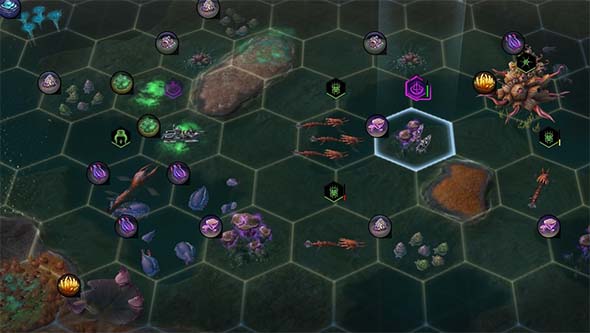
The oceans are alive with life and resources, giving reason to found aquatic cities.
Aliens are also active in the oceans. Sea creatures will build nests (just like their land counterparts), and there's a new alien creature called Hydrocoral that is stationary but which spreads across the ocean surface if left unchecked. Resource pods, artifacts, and quest triggers can all also be found in the ocean. So there's plenty to do in the water now, oceans feel more like a genuine part of the map rather than just dead space between continents, and the variety of features and resources in the ocean helps to make the world look more alien.
... [More]
da86c697-6def-4ade-b575-051869e1f38d|2|5.0
Tags:Sid Meier's Civilization, Civilization: Beyond Earth, Civilization: Beyond Earth: Rising Tide, Rising Tide, Firaxis, 2K Games, PC, Steam, strategy, grand strategy, turn-based strategy, science fiction, space, water, aquatic city, nomad, ocean, trench, submarine, diplomacy, affinity, alien, Civilization: Beyond Earth
|

| 12 | | | | | | | 60 | | 11 | | | | | | | 55 | | 10 | | | | | | | 50 | | 09 | | | | | | | 45 | | 08 | | | | | | | 40 | | 07 | | | | | | | 35 | | 06 | | | | | | | 30 | | 05 | | | | | | | 25 | | 04 | | | | | | | 20 | | 03 | | | | | | | 15 | | 02 | | | | | | | 10 | | 01 | | | | | | | 05 |
|